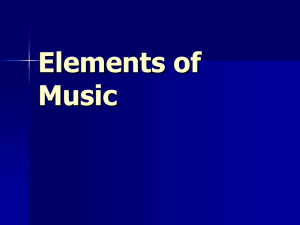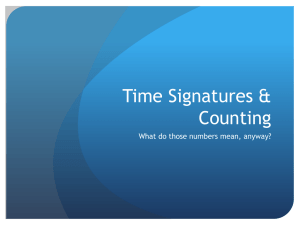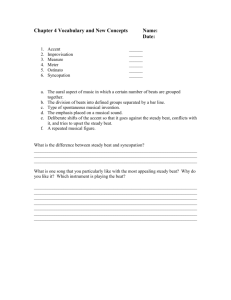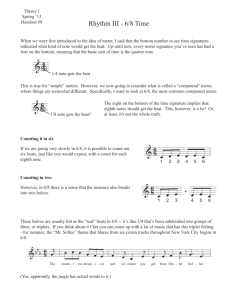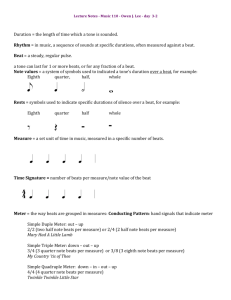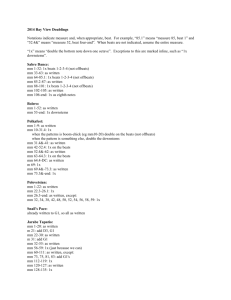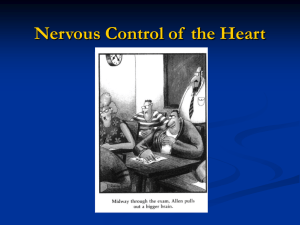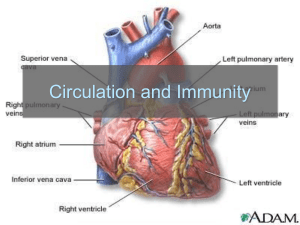Music Homework Booklet Homework 1: Note Names Music is written
advertisement
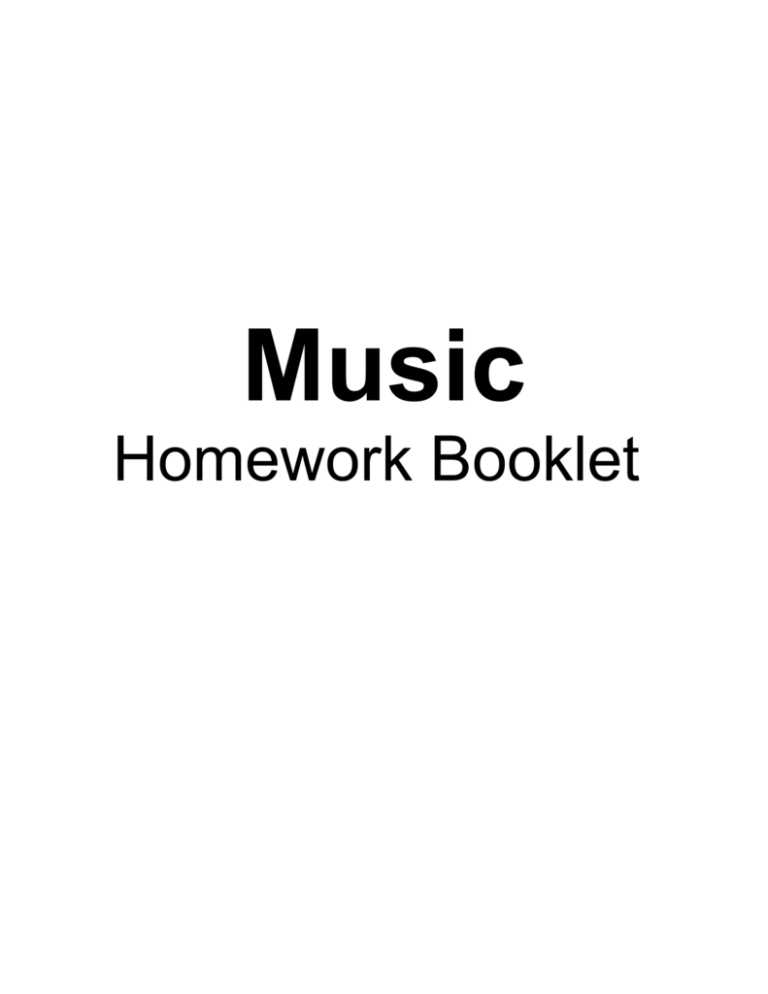
Music Homework Booklet Homework 1: Note Names Music is written through symbols called notes. These notes are named after the first seven letters of the alphabet, A-G. Music notes are written on a five lines, called the stave. Notes can be placed on the lines or in the spaces between the lines. The names of the notes in the spaces are: The names of the notes on the lines are: The note names in the spaces spell FACE. Can you think of a phrase to remember the note names on the lines? For example, the phrase Every Good Boy Deserves Fruit is a simple sentence and uses the names of the notes in the correct order. E________ G________ B________ D________ F________ Can you name these notes? The symbol at the beginning of every line of music is called a treble clef. Music notes are divided by lines on the stave, called bar lines. At the very end of a piece of music there is always a double bar line. The set of numbers at the beginning of a piece of music is called the time signature. Using the stave below, practise drawing ten treble clefs: Putting together everything that you have learned, can you label all the musical symbols on this piece of music, including the names of the notes. Homework 3: Note Values There are many different types of notes. This is to represent how many beats each note is worth. They all look different and have a name. Semibreve Minim = = 4 beats 2 beats Crotchet = 1 beat Quaver = ½ beat Semi-quaver = ¼ beat This means that four quavers are equal to two crotchets, that two crotchet are equal to one minim, etc. The chart below will help to explain this: How long is each note? Complete the following sentences with the right answer. The first and last sentences have been completed as examples. lasts as long as 2 lasts as long as __ lasts as long as __ lasts as long as __ lasts as long as __ lasts as long as 8 When there are two or more quavers in music, they can be joined together, like this: When there are two or more semiquavers in music, they can also be joined together, like this: Look at the following piece of music. Underneath all the notes, write in the number of beats in each one (i.e. 1 beat, ¼ beat, 2 beats etc.): Using the blank stave below, draw your own set of notes in whichever order you like. You must then label the name of each note (i.e. A B C D E F or G) and also the value of each note (i.e. 4 beats, 2 beats, 1 beat, ½ beat or ¼ beat): Homework 4: Rests As well as playing notes, there are times in the music when there are silences and pauses. These are called rests. Rests have the same names as the notes that they match up with: Semibreve Rest = 4 beats Minim Rest = 2 beats Crotchet Rest Quaver Rest = 1 beat = ½ beat Semi-quaver Rest = ¼ beat Using the stave below, practise drawing ten crotchet rests: Using the stave below, practise drawing ten quaver rests: Look at the following piece of music. Underneath all the rests, write in their length values. Homework 5: Time Signatures It is very important to be able to count music. In all music you will find a time signature, this tells you everything you need to know when counting music. Time signatures are always placed after the key signature (treble clef) at the beginning of a piece of music. The top number tells you how many beats there are in each bar. 4/4 means that you have no more than 4 beats in each bar. (Remember a bar is divided by vertical bar lines). The bottom number tells you the type of beat that you are counting in. The 4 at the bottom represents crotchet beats. This means that 4/4 tells you there are 4 counts of 1 beat in each bar. Imagine that each bar is a cupcake box. The top number in the time signature tells you how many cupcakes each box can hold, i.e. 4 in this case. The bottom number tells you the type of cupcake each box holds, i.e. 1 whole cupcake, in this case. This tells us that 4/4 means each box can hold 4 whole cupcakes. We know now that 4/4 means 4 crotchet beats in each bar. Look at the time signatures below. For each one circle the number that tells you how many beats there are in each bar. In the space below, draw a cupcake box holding the correct number of whole cupcakes for the following time signature. Homework 2: Keys on the Piano The keys on a piano are notes and also have names. They match up with the names of music notes. Every black note on a piano has two different names. The two symbols shown on the diagram represent this. is the symbol for sharp. is the symbol for flat. For example: Eb means E flat, and C# means C sharp. Using different coloured pencils, work out how many different notes there are on the white keys only of a piano. Colour in the same notes in the same colour. For example, if you decide C is red, find all the C’s on the diagram below and colour them in red, etc. Including both C’s, how many white notes are there between two C’s? ______. This is called an octave, (the distance between two of the same note). Homework 6: Sharps and Flats We’ve already had a brief look at sharps and flats. On a piano every single black key is either a sharp or a flat, as it has two names. Remember that is the symbol for sharp, and is the symbol for flat. You will notice that all the straight lines link a white note to a black note that is diagonally on the right, i.e. C to C#, F to F#, G to G# etc. All the dotted and dashed lines link a white note to a black note that is diagonally to the left, i.e. B to Bb, A to Ab, E to Eb etc. The reason for the black keys having two names is because if you flatten a note, it is being made to sound lower (the dotted and dashed lines going left on the piano). If you sharpen a note, it is being made to sound higher (the straight lines going right on the piano). Look at the following notes and their symbols. Name the note, (i.e. A B C D E F or G) and say whether they have been made to sound lower, or higher. __________ __________ __________ __________ __________ __________ Homework 7: Musical Vocabulary When describing music, there are words and phrases used that you may not use in every day life. For example, when using the word tempo, we are talking about the speed of the music. See if you can complete the table opposite, matching up the sets of pictures to the correct musical meaning. G D A E C F B Musical Definition Tempo (Speed) Pitch (High or Low notes) Texture (Thick or Thin) Duration (Length) Dynamics (Volume) Structure Timbre (Sound of the Instruments) Picture
